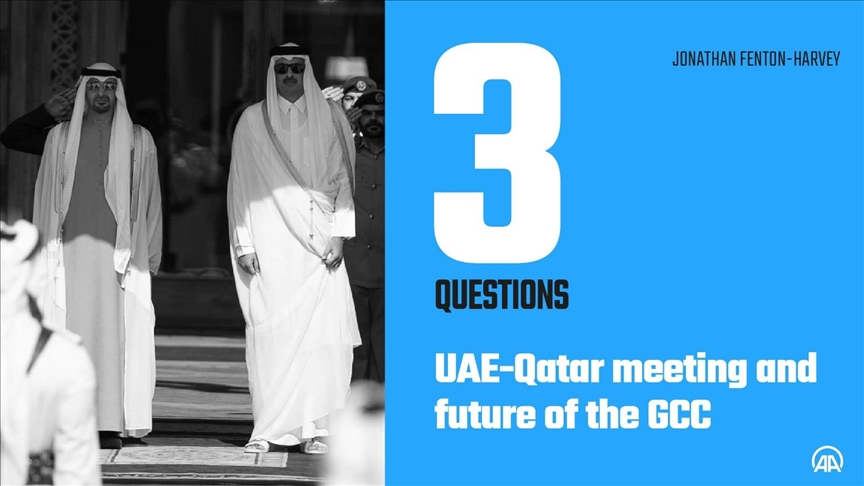
- The author is a researcher and journalist focusing on conflict and geopolitics in the Middle East and North Africa, primarily related to the Gulf region.
ISTANBUL (AA) - In 3 questions, Jonathan Fenton-Harvey evaluates the possibility of future cooperation between GCC countries for Anadolu Agency's Analysis Department.
Is the diplomatic crisis with Qatar coming to an end?
The United Arab Emirates (UAE) leader Mohammad bin Zayed’s surprise visit to Doha on December 5, the first since the 2017 diplomatic rift with Qatar, signaled that the Gulf Cooperation Council (GCC) rift has mostly healed. The visit saw bin Zayed praise Qatar’s “successful” hosting of the FIFA World Cup while calling it a “success and honor” for all Arabs.
That surprise blockade on Qatar in June 2017, in which Saudi Arabia, Egypt and Bahrain also joined the UAE in severing ties with Doha over various foreign policy divergences including towards the Arab Spring revolutions and Iran, suggested GCC unity was truly fractured.
During the Gulf crisis, when even Saudi Arabia occasionally showed more receptivity to a settlement with Qatar, it was the UAE that largely opposed diplomacy with Doha. So, this meeting is very symbolic that the crisis has largely ended.
Crucially, even the Emirati president’s key diplomatic adviser Anwar Gargash wrote on Twitter that the meeting was “another step towards strengthening Gulf solidarity and joint action,” showing desires to consolidate positive intra-GCC relations.
Although the UAE and Bahrain have not fully re-established ties with Qatar, such as not appointing their own envoys to the Gulf nation, trade ties have resumed between the UAE and Qatar. However, the talks between bin Zayed and Qatar’s Emir Sheikh Tamim bin Hamad al Thani, which also involved discussing bilateral relations between Abu Dhabi and Doha, indicate that we could expect to see further consolidations of relations going into 2023 and beyond.
What is the context behind the improvement of relations?
As mentioned, bin Zayed’s visit to Doha amid Qatar’s hosting of the World Cup presented an image that the GCC is moving on from its past divisions. The UAE has enjoyed mutual benefits from the World Cup, such as increased travel and hospitality within its own borders.
However, there is largely a combination of ‘battle weariness’ over past tensions and new global challenges unifying the GCC states. Initially, the blockading countries failed to achieve their objectives in pressuring Qatar to fall in line with their own foreign policy visions, and the ongoing blockade created a diplomatic backlash among their Western allies.
Now, GCC states are understandably more focused on wider developments globally, which could impact their economies and national security. Among these are the war in Ukraine and its subsequent economic impact. As well as continuing unity between OPEC, the subsequent unity over managing oil prices and output has been a mutual concern for GCC member states too. Even at the annual GCC summit on December 9, Saudi Arabia’s Crown Prince Mohammad bin Salman said member states will aim for increased intra-GCC unity to collectively manage the crisis.
Concerns over regional and global security, particularly after the US’ botched withdrawal in Afghanistan in 2021 and renewed Saudi Iranian tensions have been another factor, particularly as the GCC has often accused Tehran of ongoing involvement in various countries’ political affairs and conflicts, such as Iraq, Yemen, Syria and Lebanon. Thus, desires to consolidate domestic and regional security are seemingly uniting the GCC states once again.
What are the prospects for the future of GCC in general?
Some divisions between the states were not fully resolved but were instead side-lined as GCC states faced more urgent problems. Thus, with global security and economic concerns at the forefront, it is likely that we could see further steps towards GCC unity over the short and medium term.
Also, after two significant Conference of the Parties (COP 26 and COP 27) and pressure for global states to achieve net zero carbon emissions to combat climate change, developments such as the Middle East Green Initiative could further consolidate economic and political cooperation within the GCC.
Moreover, as we enter an increasingly multipolar world, with not only China and the United States dominating world affairs but also emerging economies and unions like the BRICS (Brazil, Russia, India, China and South Africa), it has prompted the GCC to find a new role in the world.
Indeed, the recent China Summit held in Riyadh in December, with Chinese President Xi Jinping pledging to invest more in Riyadh, reveals a phenomenon that has become clearer throughout 2022: The GCC has more options than just the US. Member states will likely to continue to pursue more independent trade deals with China and even Russia, even if it irks the US.
While individual states may continue to find their own paths, such as Saudi Arabia’s recent desires to expand its investments in Africa or Qatar’s desires to side more with the US over Russia’s war in Ukraine, the bloc’s countries clearly see that cooperation is beneficial for their own economic and political security.
*Opinions expressed in this article are the author’s own and do not necessarily reflect the editorial policy of Anadolu Agency.
Anadolu Agency website contains only a portion of the news stories offered to subscribers in the AA News Broadcasting System (HAS), and in summarized form. Please contact us for subscription options.







